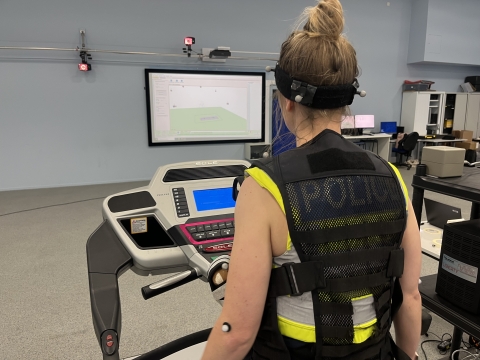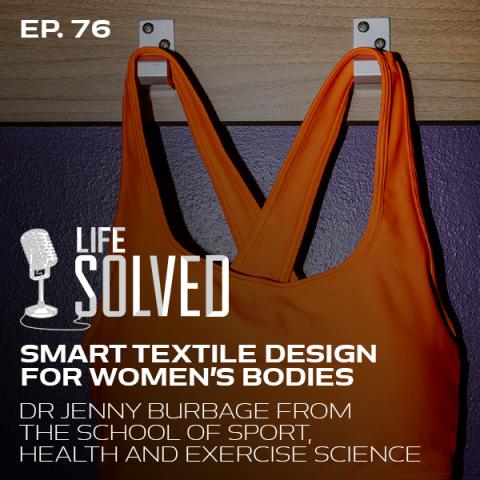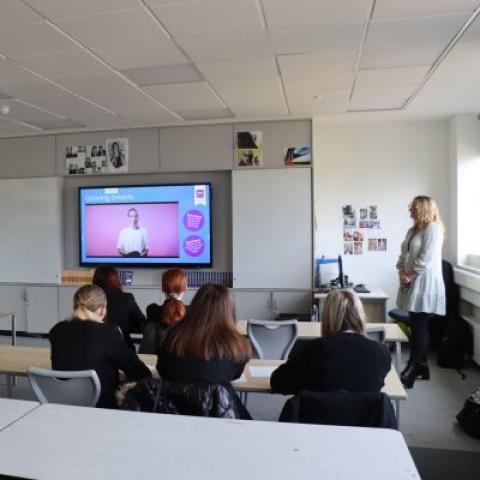

Breast health experts will provide support and advice for officers and staff, and test the effectiveness of protective gear on women’s bodies
14 June 2023
7
Female police officers and staff will learn about the significant impact breast health and bra choices can have on performance and wellbeing as part of a new trial.
Oscar Kilo, the National Police Wellbeing Service (NPWS), has employed experts from the University of Portsmouth’s Research Group in Breast Health (RGBH) and the University of Lincoln to develop an educational initiative that could eventually be used by all forces.
It will cover a range of topics, including breast pain, breast size, bra fit issues and appropriate breast support.
The team will also carry out an evaluation of police officer personal protective equipment (PPE), such as body armour and tactical vests, to understand how they interact with different bra styles and potentially impact breast health.
There are over 50,000 females working in UK policing who can wear body armour as part of their role. Feedback shows they can be uncomfortable and even painful when worn for hours.
It was re-designed earlier this year to be lighter and more flexible, with a female-specific version issued. However, not all forces have upgraded to the new kit. The study will evaluate protective equipment to see if it is providing enough support and protection.
Without the right breast support, a female officer is restricted physically, mentally, and also at a greater risk of being injured because they’re not properly fitted and protected.
Dr Jenny Burbage, University of Portsmouth's Research Group in Breast Health
Dr Jenny Burbage, from the RGBH at the University’s School of Psychology, Sport and Health Sciences, is co-leading the project with Dr Franky Mulloy at the University of Lincoln.
She said: “Police activity is physically demanding, with officers often having to perform strenuous activities, like running and self-defence.
“Without the right breast support, a female officer is restricted physically, mentally, and also at a greater risk of being injured because they’re not properly fitted and protected.”
The National Police Wellbeing Service, Oscar Kilo, has resources on sleep, nutrition, and general health, but nothing specifically on breast education.
Dr Yvonne Taylor, Chief Inspector and OK Healthy Living Lead from NPWS, said: “Our goal is for all females in policing to have access to useful breast health resources and information, no matter what force they’re in.
“We’re excited to be working with world-leading experts in the field of biomechanics at the universities of Portsmouth and Lincoln on this project.”
Studies have shown only 17 percent of female police officers wear a sports bra when on duty, with the main bra type (71 percent) being underwired.
While sports bras are known to reduce breast movement and pain during high intensity activities, their suitability for long-term wear is currently unknown.
“We want to test how effective and comfortable sports bras are for officers who are wearing them under PPE”, explained Dr Burbage.
“Recent reports suggest the majority of females wearing body armour find it either uncomfortable or very uncomfortable with a bra, regardless of the type worn. Clearly there’s a need for further research into how the two interact.
“Our lab-based project will measure breast movement underneath the armour, and monitor how officers move with them on. We’ll also check if any part of the body is exposed or at risk of injury because of this movement.”
More work is needed to determine how well the protective equipment interacts with different bras, breast sizes and shapes.
Dr Franky Mulloy, Visiting Senior Fellow in Biomechanics at the University of Lincoln
Dr Franky Mulloy, Visiting Senior Fellow, and former Senior Lecturer in Biomechanics at the University of Lincoln UK, added: “There’s a clear need for large scale research to identify what’s causing discomfort whilst wearing PPE, and to use these findings to modify the existing tactical vest design.
“More work is needed to determine how well the protective equipment interacts with different bras, breast sizes and shapes.”
For this project, a number of female police officers are being invited to a motion capture lab at the University of Lincoln to perform a range of movements anticipated during operational duties.
Beth Canty, a Senior Research Associate at the University of Portsmouth who is testing the individuals, explained: “We’ll ask the participants to do tasks, like running and jumping, with various combinations of equipment and bras. Then using reflective markers on anatomical landmarks on their bodies, we’ll accurately track their movement using state-of-the-art motion capture systems.
“Specialist electromagnetic sensors are also going to be placed on the breast and bra to measure motion in the different configurations.”

Micro electromagnetic sensor placements in a configuration to assess breast motion and bra support © Helen Yates/University of Portsmouth
School of Psychology, Sport and Health Sciences at the University of Portsmouth has housed the world-renowned Research Group in Breast Health (RGBH) for over a decade. Its scientists have worked with lingerie manufacturers, the military, the NHS and other organisations, to test bras and to inspire changes in their design.
Last year, the RGBH team received international recognition for their part in providing personalised bra prescriptions to the England Lionesses ahead of their European championships win. They also helped schoolgirls across the UK learn about the importance of breast health, as part of the Treasure Your Chest initiative.
More like this...
Smart textile design for women’s bodies ft. Dr Jenny Burbage
13 October 2022
16 min listen

Treasure Your Chest initiative to help educate schoolgirls on breast health
31 October 2022
6

